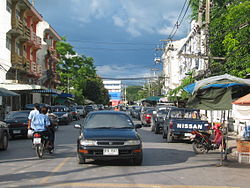Nakhon Nayok Province
|
Nakhon Nayok นครนายก |
||
|---|---|---|
| Province | ||
 |
||
|
||
 Map of Thailand highlighting Nakhon Nayok Province |
||
| Country |
|
|
| Capital | Nakhon Nayok City | |
| Government | ||
| • Governor | Pradit Yamanan (since October 2016) | |
| Area | ||
| • Total | 2,122 km2 (819 sq mi) | |
| Area rank | Ranked 66th | |
| Population (2014) | ||
| • Total | 257,300 | |
| • Rank | Ranked 70th | |
| • Density | 120/km2 (310/sq mi) | |
| • Density rank | Ranked 41st | |
| Time zone | ICT (UTC+7) | |
| ISO 3166 code | TH-26 | |
Nakhon Nayok (Thai: นครนายก, pronounced [náʔ.kʰɔ̄ːn nāː.jók]) is one of the central provinces (changwat) of Thailand, established by the , which came into force as of 9 March 1946.
Neighboring provinces are (from north clockwise) Saraburi, Nakhon Ratchasima, Prachinburi, Chachoengsao, and Pathum Thani.
Nakhon Nayok is renowned for its refreshing waterfalls and abundant varieties of fruits.
The word "nakhon" originates from the Sanskrit word "nagara" (Devanagari: नगर) meaning "city", and the word "nayok" is thought to have been derived from the Sanskrit "nāyaka" (Devanagari: नायक) meaning "leader" or "captain". However, in this connection, "na" means "[tax of] rice field" and "yok" means "exempted". Hence the name of the province literally means "tax-free city".
The northern part of the province is in the Sankamphaeng Range, the southern prolongation of the Dong Phaya Yen mountain range, with the highest elevation the 1,292 meter high Yod Khao Kiew. Most of that area is covered by the Khao Yai National Park. The central part of the province however is a rather flat river plain formed by the Nakhon Nayok River. The southern part of the province has relatively infertile acidic soil.
The main river of the province is the Nakhon Nayok River. It joins the Prachinburi River at Pak Nam Yothaka in Amphoe Ban Sang, Prachinburi province, which then becomes the Bang Pa Kong River.
...
Wikipedia

